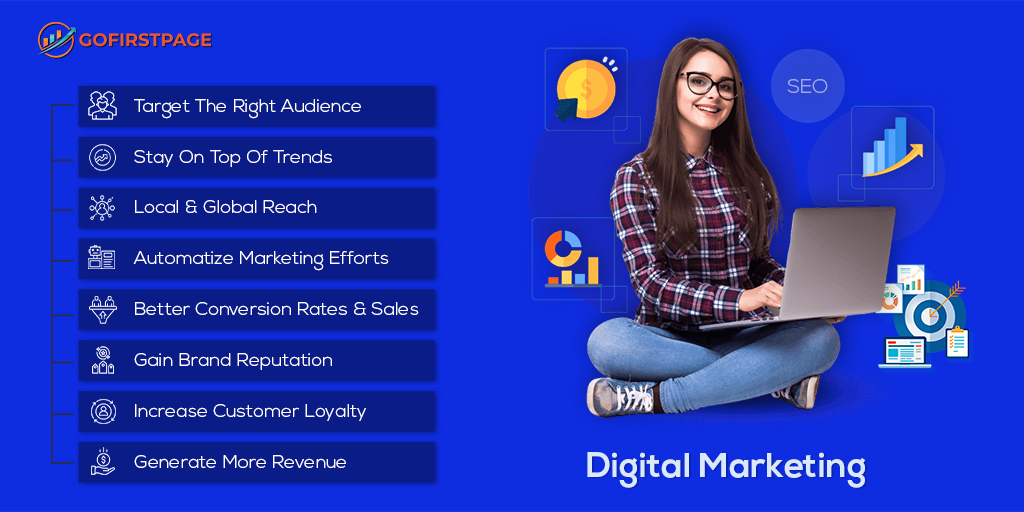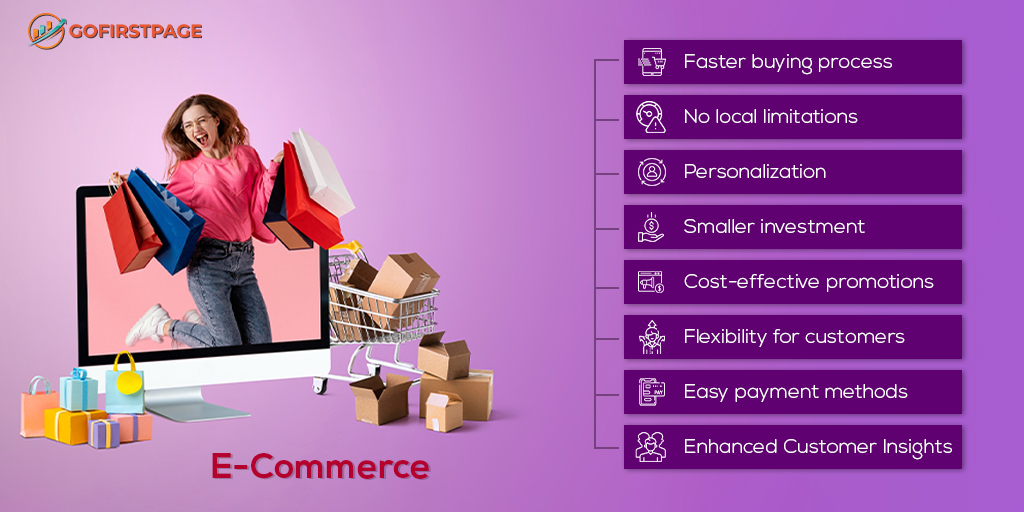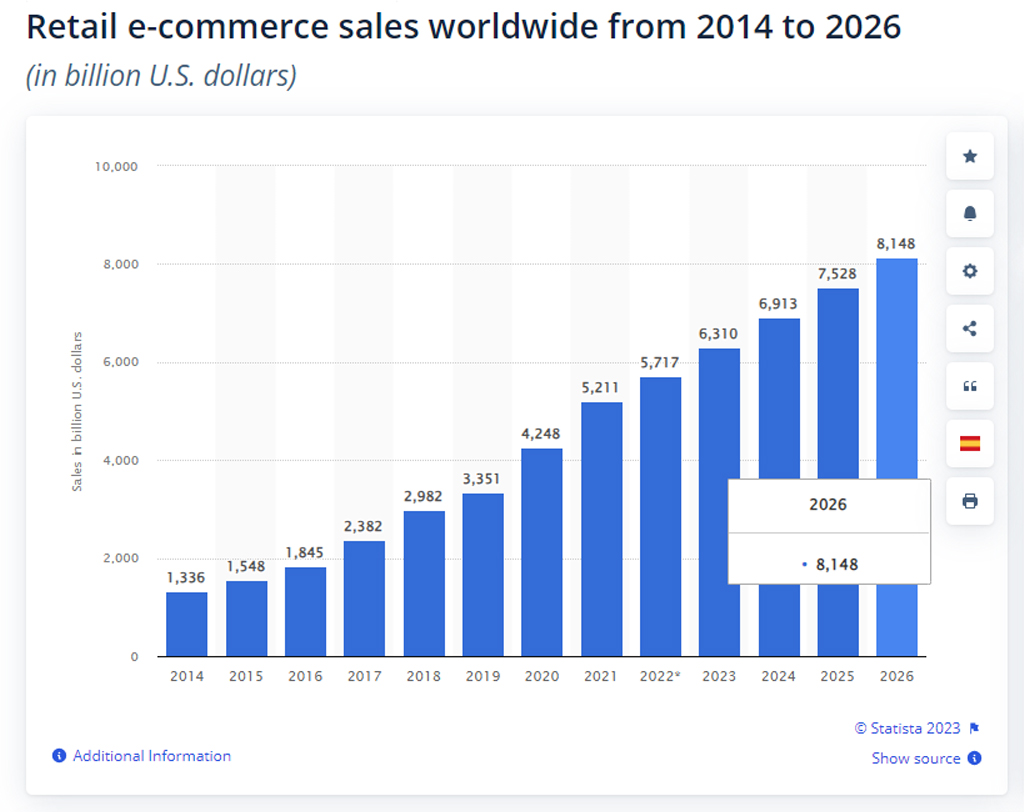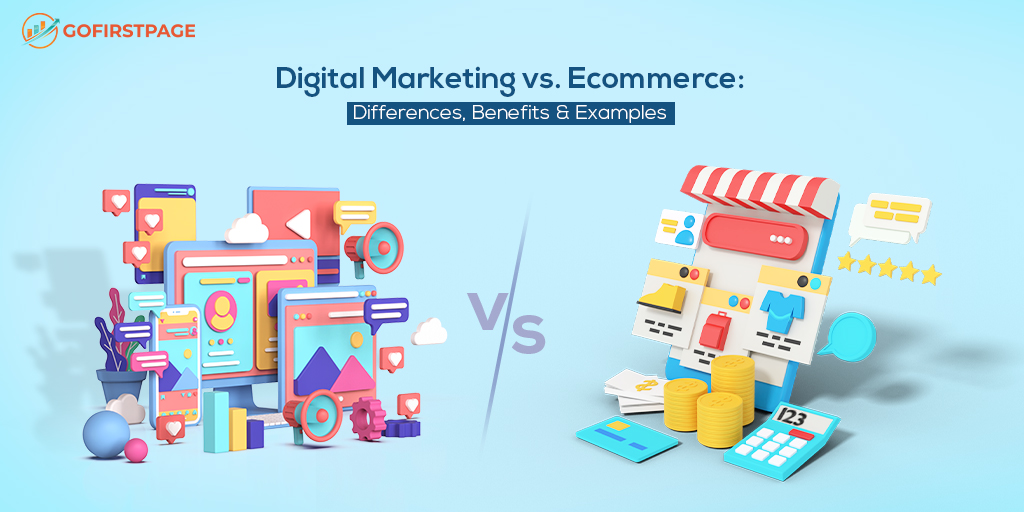In today’s fast-paced digital world, businesses rely heavily on two crucial pillars for success: digital marketing and e-commerce. These terms often intertwine, leading to a common misconception that they are synonymous. There is a lot of misinformation about these topics that certainly can confuse people. In fact, there is nothing such as e-commerce vs digital marketing. It should be more like e-commerce and digital marketing. These terms do not compete; they collaborate.
Want to know the main differences between e-commerce and digital marketing and their benefits? In this blog post, we’ll explain the difference between digital marketing and e-commerce, their exact meaning, benefits, key components with real examples, and how to leverage them. So keep reading to learn more!
What Is Digital Marketing?
Digital marketing uses the internet and online-based digital technologies to strategize & promote products, services, or brands to the target audience. It uses different digital channels to promote business items. You can use SEO (Google search), social media, Google My Business optimization, email marketing, PPC, blogs, or websites to connect with customers and drive engagement.

It has evolved significantly, leveraging cutting-edge technologies to reach potential customers effectively. Keep reading this guide on the difference between digital marketing and e-commerce & best practices you need to follow to make your strategy & business successful.
Example of Digital Marketing:
Let’s say you own a clothing brand and use digital marketing tactics to increase your online visibility, conversions, and sales. Optimizing your brand website with SEO audit & tech methods to increase your ranking in Google search engine results. Social media campaigns showcase your latest fashion trends to attract and engage your target audience quickly. Personalized email marketing that provides exclusive discounts that drive repeat purchases. Now you get it; combining all these key digital marketing tactics, your brand reaches your target audience, creates brand loyalty, and drives high business growth.
Key Components of Digital Marketing With Examples:
➔ Search Engine Optimization (SEO): SEO is optimizing website content to rank higher on SERPs or the first page of Google results. Your Businesses can increase organic traffic, connect with your audience, improve your brand, increase leads, and get sales by employing effective SEO techniques like relevant keywords, creating high-quality content, and enhancing website structure.
➔ Social Media Marketing: The power of social media cannot be understated in today’s digital landscape. Businesses like yours use social media platforms like Facebook, Instagram, Twitter, and LinkedIn to engage with the target audience, build brand awareness, and drive more conversions. You must apply the strategic plan to get more sales.
➔ Content Marketing: Content marketing involves creating and distributing valuable and relevant content to attract and retain customers. Blogs, videos, infographics, and podcasts are popular content formats that establish authority and trust. Avoid using thin content, as it can damage your brand authority.
➔ Search Engine Marketing (SEM). It consists of placing paid ads within search engines, and unlike SEO, the results are immediate. Keep reading this guide on digital marketing vs ecommerce & best practices you must follow to make your strategy & business successful.
➔ Email Marketing: Email marketing remains a potent tool for nurturing leads and fostering customer loyalty. Personalized and targeted email campaigns can help your business maintain meaningful connections with your brand audience. It is based on the massive sending of emails to a contact list, giving you the possibility of having a more direct connection with your potential clients and generating a high conversion rate. Undoubtedly, it’s a key to your business’s success.
➔ Affiliate Marketing. Promoting other companies’ products and services on your platform. Your pay is proportional to the traffic you send the receiver’s way. It works if your website is performing well. You can learn how to make money with affiliate marketing without a website here.
What Is E-Commerce?
Ecommerce refers to buying and selling goods or services using the internet and transferring money and data to execute these transactions. It is also known as electronic commerce or internet commerce. Ecommerce is often used to refer to selling products or services online, but it can also describe any commercial transaction facilitated through the internet.

Note: Don’t mistake with e-business. Whereas e-business refers to all aspects of operating an online business, eCommerce refers specifically to the transaction of goods and services. Keep reading this guide on ecommerce and digital marketing, e commerce digital marketing & best practices you must follow to make your strategy & business successful.
Common Types Of E-Commerce
1. Business-to-Consumer (B2C): B2C e-commerce involves businesses directly selling products or services to individual customers. Popular online retailers like Amazon and eBay exemplify this model.
2. Business-to-Business (B2B): B2B e-commerce caters to business transactions. It streamlines supply chain processes and facilitates bulk purchasing.
3. Consumer-to-Consumer (C2C): C2C e-commerce empowers consumers to sell products or services to other consumers through online platforms. It has facilitated the growth of the secondhand economy and peer-to-peer sharing.

Image Source: Statista
Examples Of ECommerce Sites
● Amazon.com: Amazon is probably one of the best examples of a thriving eCommerce business. It is currently the largest e-commerce retailer in the United States.
● Alibaba: The Chinese company Alibaba is by far the world’s most successful e-commerce company and retailer, hosting the largest B2B (Alibaba.com), C2C (Taobao.com), and B2C (Tmall) marketplaces across the globe.
● Walmart: Once the top retailer in the US, Walmart has focused mightily on their online business, with great results, offering traditional retail sales, grocery delivery, and subscription services.
● eBay: One of the first e-commerce sites, eBay still dominates the digital market space, allowing businesses and individuals to sell their products online and buy by bidding on second-hand items.
Difference Between Digital Marketing And Ecommerce
Digital marketing brings attention to your brand, whereas e-commerce allows you to actually sell your product & services.
| # | Aspect | Digital Marketing | E-commerce |
| 1 | Definition | Promoting products/services using digital channels | Buying and selling goods/services online |
| 2 | Focus | Attracting and engaging customers | Facilitating online transactions |
| 3 | Goal | Increase brand visibility and customer engagement | Drive sales and boost revenue |
| 4 | Interaction | Two-way communication with customers | One-way transactional process |
| 5 | Audience Reach | Global reach through various digital platforms | Targeted reach based on online store demographics |
| 6 | Business Impact | Enhances brand reputation and awareness | Enables scalability and broader market reach |
| 7 | Relationship Building | Nurturing customer relationships through content | Providing a seamless user experience |
| 8 | Long-term Sustainability | Sustains customer loyalty and brand advocacy | Ensures continuous revenue generation |
| 9 | Sales Cycle | Influences customers at various stages of the journey | Complete the transactional process from browsing to buy |
| 10 | Strategies | SEO, social media, email marketing, content creation | Online storefronts, secure payment gateways |
The Term Ecommerce Digital Marketing
So what happens when you combine both? Then you get Ecommerce digital marketing! E-commerce digital marketing refers to the strategies and techniques to promote and sell products or services online through electronic commerce platforms. It encompasses various marketing activities to drive traffic, increase conversions, and generate revenue for an online store. Keep reading this guide on ecommerce and digital marketing, e commerce digital marketing & best practices you must follow to make your strategy & business successful.
Here are some key components of e-commerce digital marketing:
● Search Engine Optimization – Increase organic visibility & attract appropriate traffic to your digital store by optimizing your ecommerce website and product pages, & applying powerful internal linking to rank higher in SERPs.
● Content Marketing – Create and distribute valuable, informative, and product-based content (e.g., blog posts, videos, and infographics) that engages potential customers, builds brand awareness, and establishes thought leadership.
● Social Media Marketing – Engage with your target audience on social media platforms such as Instagram, Facebook, and Twitter to share your product offers, updates, and promotions to reach a wider audience.
● Email Marketing – Create an email list of your customers and send targeted newsletters and promotional emails to nurture relationships and drive sales and repeat purchases.
● Paid Advertising – Run PPC advertising campaigns to target your audience with specific keywords, behavior, demographics, or interests.
● Retargeting and Remarketing: Target people who have browsed the online store or have expressed curiosity about your products, reminding them and prompting them to purchase now.
● Conversion Rate Optimization: Analyze user behavior, apply ecommerce SEO, improve the site design, run A/B tests, and layout and UX of your website to increase conversion rates and sales.
● Analytics and Data Analysis: Last but important is monitoring key performance indicators, analyzing customer behavior, and using insights to enhance marketing plans and improve the ecommerce store’s performance.
Ecommerce digital marketing aims to increase brand awareness, target traffic, convert customers, and increase ecommerce sales and revenue online. Make sure you apply the right strategies & show your store online with appropriate NAP details to make it visible perfectly. Ecommerce digital marketing is a multi-faceted marketing strategy that combines different channels and techniques to create a unified and effective marketing plan for your ecommerce business.
Over To You: Improve Your Digital Marketing & Ecommerce Efforts
Understanding the difference between digital marketing and e-commerce is important for businesses looking to prosper in this digital era. Digital marketing is a powerful tool to connect with your customers, enhance brand awareness, and build relationships, whereas e-commerce enables seamless online shopping with global reach. Combining both strengths can unlock remarkable growth chances and upgrade your business.
Ready to boost your brand’s online visibility and achieve exceptional growth? Partner with our GoFirstPage SEO services today! Our expert team will leverage the power of digital marketing to drive targeted traffic to your e-commerce platform, & you will watch your website reach new heights in search engine rankings, resulting in increased sales, higher conversions, and lasting customer loyalty. Contact us now @ +1 (917) 277-7780 or email us at info@gofirstpage.com for a personalized strategy tailored to your business needs!
Answers To Common Questions: Quick Overview
What is digital marketing, and how does it differ from e-commerce?
Digital marketing is like the ultimate megaphone for businesses! It’s all about promoting products and services using digital channels like social media, SEO, and email. On the other hand, e-commerce is like your online shopping buddy—it’s where you buy and sell stuff over the Internet. While digital marketing shouts about your brand, e-commerce is where shopping magic happens.
Can you use digital marketing without an e-commerce platform, or vice versa?
Yes, you can! Digital marketing works wonders in spreading the word about your business, even if you don’t sell online. On the flip side, you can have an e-commerce platform without much marketing, but you might miss out on reaching many potential customers. Combining both is the actual secret sauce!
How does SEO fit into digital marketing, and how does it impact e-commerce success?
Think of SEO as the treasure for search engine results. It helps your brand website rank higher in SERPs, which means more people will find you online easily. When it comes to e-commerce, effective SEO ensures your products are easily discoverable, attracting shoppers like bees to honey.
How can digital marketing strategies, like email campaigns, benefit my e-commerce business?
Email campaigns are like sending personalized letters to your customers. They keep your audience engaged, share exciting offers, and build loyal relationships. That means more repeat customers and higher sales for your e-commerce venture—a win-win situation!
How does content marketing play a role in e-commerce growth?
Content marketing is like storytelling with a strong purpose. Creating valuable blogs, guides & videos showcases your expertise and wins customer trust. People who trust you are likelier to buy from your e-commerce store and even recommend you to friends.
Is e-commerce just about selling products, or can it also apply to services?
It’s not just for products. E-commerce is perfect for selling services too! From online consultations to booking appointments, it’s a great medium for businesses in the service industry to shine and reach a broader audience.
What are the key advantages of integrating digital marketing and e-commerce strategies?
Your brand gets a massive boost when digital marketing and e-commerce join forces. You reach more targeted customers, sell more products, and gain valuable insights about your customers’ preferences.
Can digital marketing help my brick-and-mortar store transition into e-commerce successfully?
Absolutely! Digital marketing helps your physical store go online by creating a buzz, attracting customers to your virtual storefront, and ensuring a smooth transition.




